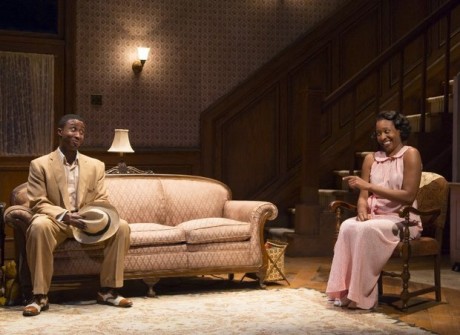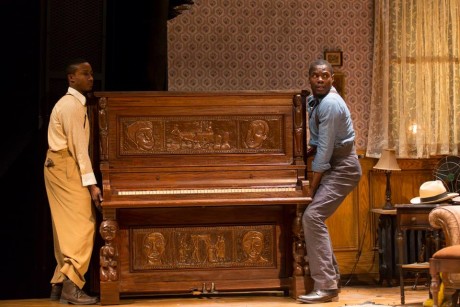August Wilson’s The Piano Lesson is, on its surface, just a story about a brother and sister who argue over whether to sell a family heirloom. What makes the play so special is that the piano in question isn’t the only thing that makes beautiful music here. Wilson’s poetic language and vivid characters makes the tale a distinctive one. And Director Jade King Carroll’s production at the McCarter Theatre has an appealing cast and a melodious, unhurried tone that explodes into vitality at just the right moments.
Like so many of Wilson’s plays, The Piano Lesson is immersed in themes of mysticism, history and family legacy. In this case, that legacy is symbolized by a piano that Berniece Charles, a young widowed mother, keeps in her Pittsburgh home in 1936, even though she refuses to play it anymore. Her brother, Boy Willie, arrives from Mississippi, intending to sell the piano so he can buy farmland from the descendants of the slaveholders who once owned members of the Charles family. To Boy Willie, the piano is just an asset to be disposed of in order to further his ambitions. But this isn’t just any piano; it’s carved with images of their family’s roots in slavery. “All of that is in the past,” says Boy Willie dismissively when he hears the saga of the piano’s history. But to Berniece, the past is present – it’s something that can never be escaped. “Money can’t buy what that piano cost,” she says. In the end, the dispute is resolved – not with a spat between siblings but in a showdown with an unexpected power.

The Piano Lesson runs nearly three hours, and at times it can feel somewhat stagnant. A few sections are devoted to long speeches, like the one that details the piano’s history, that stop the action cold. You’ll have to listen closely to catch all the nuances of the Charles family’s history, and even then a few details might escape you. (We’re told several times that a woman named Cleotha has just died, but I had to rely on the family tree printed in the program to find out who she was.) And Wilson’s use of mysticism can feel less like a natural part of the characters’ lives than a contrivance which disrupts the story’s authenticity.

Yet there’s a richness to The Piano Lesson. The Charles family comes across as a family trying to live their lives with dignity in the face of a million little indignities. (The tales a few characters tell of their brushes with the law say a lot in just a few words about the struggles of African Americans in a Jim Crow world.) Wilson’s use of music –most notably in a work song sung by the men – illustrates the power of music to bond and heal. In Berniece, Wilson provides a strong, independent heroine whose forthright attitude bridges the gap between the subjugation of the 19th century and the liberation of the late 20th century. And the message of The Piano Lesson – that we can’t move on, as a family or as a nation, without confronting our past – is one that gains resonance by seeing how it affects the different members of the family.
Carroll gets excellent performances from the cast; there’s a strong sense of a family dynamic in the actors’ chemistry. Stephen Tyrone Wiliams has a nice, laidback charm as Boy Willie, which makes his flashes of anger even more effective.
Miriam A. Hyman is a formidable and sympathetic Berniece, and she’s well-matched with Berniece’s two suitors, preacher Avery (a sweet and sincere Osiwo Odera) and laborer Lymon (David Pegram, sly and disarming). John Earl Jelks shows impressive strength and vocal inflections as Doaker, an uncle who participates in the family dispute without making enemies. And Cleavant Derricks gives Doaker’s brother Wining Boy, a character who could be simply comic relief in lesser hands, a deep undertone of melancholy.
Paul Tazewell’s costumes are appropriate to the era, adding just the right touch of flash when needed, as with some colorful suits for the showman Wining Boy. Edward Pierce’s lighting handles pre-dawn and late night scenes with equal accuracy, and Bill Kirby’s sound design adds some spooky touches.
Neil Patel’s set design is remarkable, showing not only the rich woodwork of the Charles’ house but what lies beyond it. At the edges of the house, the walls are ripped away raggedly, exposing beams and planks, and revealing the tall buildings of Pittsburgh, and even the branches of a nearby tree, just outside the walls. Even here, it seems to say, the modern world is encroaching on family traditions, making the decision on whether to respect the past even more crucial.
Running Time: Two hours and 50 minutes, including one intermission.
The Piano Lesson plays through February 7, 2016 in the Berlind Theatre Auditorium at the McCarter Theatre Center – 91 University Place, in Princeton, NJ. For tickets, call the box office at (609) 258-2787, or purchase them online.




